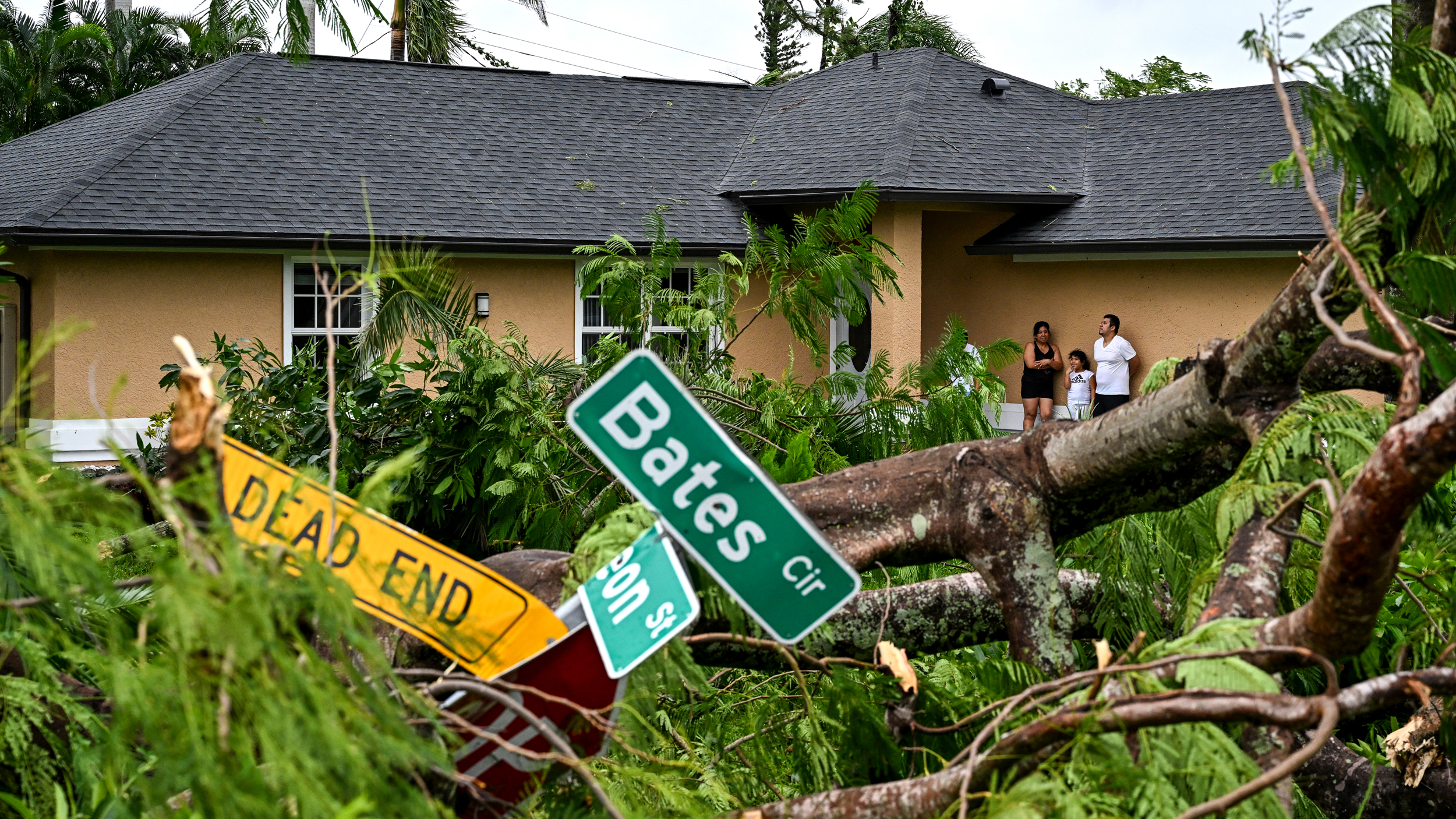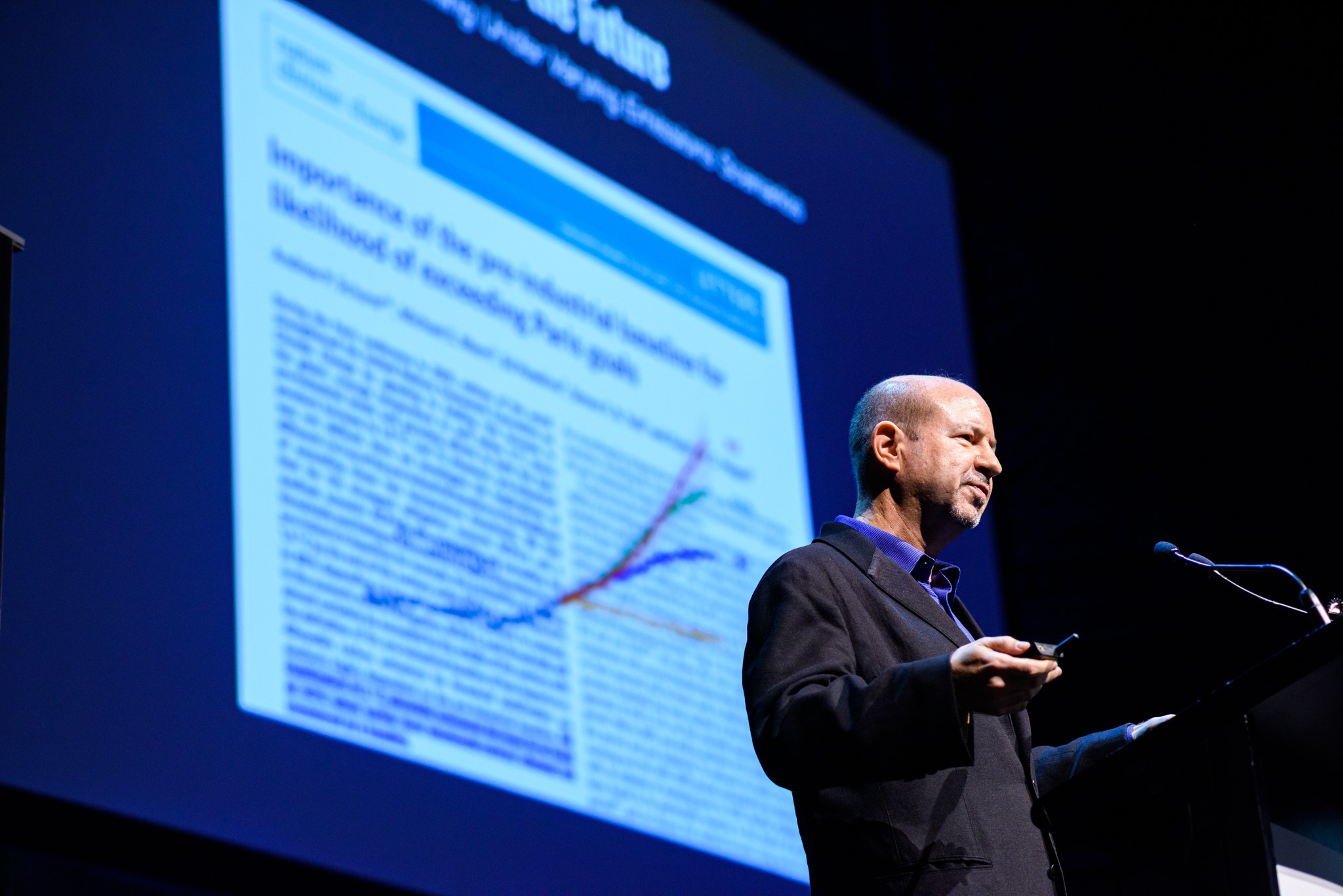Tampa Bay Avoided the Worst of Milton’s Wrath, But Millions Are Suffering After the Second Hurricane in Two Weeks Raked Florida
Rescue crews and damage assessment teams on Thursday combed through debris left behind by Hurricane Milton, which barreled 170 miles across Florida during the dark of night, creating a path of death and destruction.
It was the second major hurricane in two weeks to hammer Florida’s Gulf Coast—the first, Helene, caused devastation all the way to western North Carolina and killed more than 230 people. The double whammy will change some communities forever and has kindled new conversations about climate change amid a contentious presidential election.
Milton killed at least nine people, according to CNN. Several fatalities were reported amid a rare flurry of large, powerful tornadoes that preceded Milton’s landfall on the Gulf Coast and touched down as far away as the eastern seaboard of St. Lucie County north of Palm Beach.
More than 3 million electric customers were without power Thursday afternoon.
Explore the latest news about what’s at stake for the climate during this election season.
Both Florida Gov. Ron DeSantis and Federal Emergency Management Agency Director Deanne Criswell expressed relief that the storm did not deliver the worst-case scenario they had feared—a devastating storm surge into Tampa Bay and the metro area’s population of 3 million people. But the storm packed hurricane-strength winds and flooding that ripped into homes from the Gulf Coast to the Atlantic.
“Tornadoes ravaged parts of the east coast of the state,” DeSantis said at a press conference. “Flooding occurred on the west and east coasts, and strong winds lashed the state, especially in Pinellas, Hillsborough, Manatee and Sarasota counties.”
The storm surge reached 10 feet in Sarasota County, south of Tampa Bay, and flood waters along the path of the hurricane could take weeks to recede, he cautioned. “What we can say is the storm was significant, but thankfully, this was not the worst-case scenario,” DeSantis added.
“It is still a very bad scenario,” said Marshall Shepherd, director of the University of Georgia atmospheric sciences program. “Overall, the forecasts were extremely good with this storm.”
Dodged Bullets
The National Hurricane Center predicted Milton would be weakened by winds that disrupted the cyclone’s circulation as it approached land, and that is what happened. Also, because the hurricane made landfall about 50 miles south of Tampa, it subjected Tampa Bay to westerly winds on the north side of the storm blowing out toward the Gulf. That had the effect of pushing water out of Tampa Bay rather than driving a predicted 10 to-15 inch storm surge there.
But a different wiggle here or wobble there on its eastward approach to land could have delivered a knock-out punch to Tampa and St. Petersburg, which are along a Gulf Coast where sea levels have risen about a foot in the last century, adding to the often deadly risks of storm surges. Southeast and Gulf Coast waters have been rising five times faster than the global average since 2010, scientists at NASA have said.
A Tampa Bay Climate Science Advisory Panel has concluded that the region may experience sea level rise between 11 inches and 2.5 feet by 2050, and between 1.9 and 8.5 feet by 2100, depending on how much more climate-warming greenhouse gases the world emits and how fast glaciers and polar ice keeps melting.
Tornadoes and Hurricanes—Increasingly Volatile Couples
Born out of the overheated waters of the Gulf of Mexico, Milton had rapidly exploded into a Category 5 storm earlier in the week, made landfall Wednesday as a Category 3 storm and was still a Category 1 hurricane when it spun out into the Atlantic west of Orlando Thursday morning.
Tornadoes are always likely to occur in the outer bands of a hurricane, but weather conditions in Florida as Milton approached on Wednesday produced unusually large and deadly twisters, many of them in the eastern part of the state.
At a press conference on Thursday, Kevin Guthrie, the emergency manager for the state, said there had been at least 120 tornado warnings issued during the storm, although definitive information about how many tornadoes were spun up was still being confirmed. FEMA’s Criswell put the number at 38 Thursday morning.

One hundred and twenty would tie the record number of tornadoes produced by a hurricane that was set by Hurricane Ivan in 2004. Hurricanes Frances and Rita also produced historic numbers of tornadoes in the 21st century.
In an interview with the Associated Press, Victor Gensini, a scientist at Northern Illinois University who studies climate and tornadoes, said the tornadoes associated with Milton were “definitely out of the ordinary. Hurricanes do produce tornadoes, but they’re usually weak,” he said. “What we saw today was much closer to what we see in the Great Plains in the spring.”
In an email, Shepherd said that the lower-level and upper-level atmospheric conditions during Milton seemed to have supported the “development of supercell thunderstorms” and tornadoes in a way that is not typical of most hurricanes.
Winds Cause Widespread Power Failures
Some of the greatest damage from the storm was to electricity infrastructure, with wires and other equipment knocked out of service. As of mid-afternoon on Thursday, 3.3 million households and businesses did not have electricity, which is about 30 percent of the customers in the state, according to PowerOutage.com.
Hardee County in central Florida, which Peace River Electric Cooperative mainly serves, had an unusually high level of damage, with 97 percent of roughly 9,500 customers without power.
The state’s three largest utilities, Florida Power & Light, Duke Energy Florida and Tampa Electric Co., reported extensive damage and asked residents to prepare for what may be a long restoration process.
“We will be out there working 24 hours a day,” said Armando Pimentel, president and CEO of Florida Power & Light, at a news conference in Wellington, near Palm Beach. He dressed in a hard hat and safety vest and spoke with reporters near a utility bucket truck while workers repaired power lines that had been damaged by a tornado.
He said the damage from Milton was exacerbated by the saturation of soil from Helene two weeks ago, which allowed trees to sway more in the wind and break power lines.
Tampa Mayor Says Helene Got People’s Attention
Milton was the fifth hurricane to make landfall in the United States and the fifth to strike a Gulf Coast state this hurricane season, which runs from June 1 to November 30.
President Joe Biden called Sarasota Mayor Liz Alpert to offer the federal government’s support.
“The President wanted to see if there is anything we need in Sarasota to let him know,” the mayor said, according to the city’s Facebook page. “He understands this is going to be an unprecedented type of hurricane and also understands it will take a lot from the federal government to help us recover in Sarasota. We’re grateful for the support and thank President Biden for reaching out.”
“When people get to see first-hand the power of Mother Nature it’s very impactful, literally and figuratively.”
— Jane Castor, Tampa Mayor
Tampa Mayor Jane Castor said parts of the city experienced extensive flooding but that the damage was not as bad as she feared. She believed many residents heeded evacuation orders after weathering Helene only two weeks ago. Helene’s storm surge flooded coastal communities from southwest Florida to the Panhandle. That hurricane made landfall in Florida’s Big Bend region ahead of its violent trajectory across the Southeast to western North Carolina.
“We would like to think that everyone heeded the officials’ warnings, but I really think it’s due to Hurricane Helene,” she said. “For all of us who grew up here in the city, that’s the worst I’ve seen. When people get to see first-hand the power of Mother Nature it’s very impactful, literally and figuratively. So I think people heeded the warnings and got out.”
Milton dropped as much as 18 inches of rain on St. Petersburg, which Mayor Kenneth T. Welch said was giving the city major problems, including flooding and damage to its drinking water system. The city has issued a citywide boil water notice.
“This was a storm that intensified quickly and gave us very little time to prepare,” he said.
DeSantis Downplays Climate Impacts
As Florida and the Southeast absorb the twin gut-punches delivered by Helene and Milton, climate scientists this week had some unwelcome news. Global warming, along with reductions of sulfurous aerosol pollution, are likely to fuel even more powerful and destructive storms in the years and decades ahead.
Every 1 degree Celsius of warming increases maximum winds in the strongest storms by about 12 percent, which equates to a 40 percent increase in wind damage, said climate scientist Michael Mann, director of the Center for Science, Sustainability & the Media at the University of Pennsylvania.
“We can expect proportionally larger storm surges, rainfall and flooding,” he said. “One recent study suggests that human-caused warming boosted the Helene-related flooding in the southeastern U.S. by 40 percent.”
“All of this continues to increase as long as the warming continues,” he said, “until our carbon emissions reach zero.”

And, a study released this week by U.S. and European scientists suggested that climate change worsened Helene’s peak rain totals by 10 percent, while some experts, including Mann, think that is an underestimate and strong hurricanes entrain even more moisture.
But on the ground in Florida, interacting with reporters, DeSantis, who has a track record of discounting mainstream climate science, came prepared to answer questions about climate change and hurricanes and to deflect those concerns. Just five months ago, he signed a controversial bill, which was approved earlier this spring by the Republican-controlled legislature, that will erase several appearances of the words “climate change” from the state code and nullify goals aimed at enhancing renewable energy use in the state.
Before running into the wind shear and losing strength, Milton reached Category 5 strength twice, with winds topping out near 180 miles an hour and a barometric pressure dropping as low as 897 millibars, making the storm the second-strongest on record in the Gulf. Rita in 2005 was the strongest, with a barometric pressure of 895 millibars.
DeSantis chose to emphasize the storm’s strength at landfall, by which time its barometric pressure had risen enough so that it was at that point, he said, only the 27th strongest on record. Seventeen of those had been prior to 1960.
“People should put this into perspective,” DeSantis added. “There is nothing new under the sun.”
What has changed, he said, is that Florida now has 23 million people and the potential for damage has risen with the increasing number of residents.
Scientists agree that a growing population in hurricane zones increases the risks of damage from tropical storms. But scientists have also shown hurricanes are intensifying faster and dropping more rain, and with rising sea levels, tropical storms push tidal waters further inland, making storm surges more dangerous and deadly.
In a June 2024 study, scientists looked at tropical cyclones and tornadoes, using simulations to better understand how the changing climate could impact tornados produced during hurricanes. They found “robust evidence that tornado activity from tropical cyclones may increase in the future.”
Ultimately, the researchers concluded that hurricane-spawned tornadoes “may become more frequent and a greater hazard.”
Propaganda Attacks Response; Biden Asks Congress to Help
It’s hard enough for local first responders, states and the federal government to respond to massive hurricanes. But since Helene, and amid a closely fought presidential election, authorities, including Biden, have felt the need to respond to an onslaught of misinformation or disinformation about hurricanes and the government’s response to them, much of it spread by former President Trump and some of his allies. They have falsely claimed FEMA emergency funds had been directed to migrant services and away from storm survivors, for example, or that Democrats are somehow controlling the weather.
(DeSantis, a Republican, said Thursday: “If I could control the weather, I’d do 78 degrees and sunny year-round.”)
FEMA this week took the unusual step of responding to several false claims on its website, including a claim that FEMA was preventing evacuations in Florida.
“FEMA does not control traffic flow or conduct traffic stops, which are handled by local authorities,” the agency wrote. “This is a harmful rumor that can put lives in danger.”
FEMA’s Criswell said she had not heard any new misinformation about Milton but was monitoring the situation and would respond further if necessary.
The agency said it had more than 1,000 people in Florida supporting Milton and previous disasters in addition to 1,400 search and rescue personnel pre-staged to support Milton’s response efforts. The deployment included incident management teams, urban search and rescue teams, U.S. Coast Guard swift water rescue teams, along with health care and engineering teams.
“FEMA does not control traffic flow or conduct traffic stops, which are handled by local authorities. This is a harmful rumor that can put lives in danger.”
— FEMA website
In a brief press conference, Biden said FEMA would be opening disaster recovery centers “right away” for one-stop federal services.
He also encouraged Congress to return to Washington this month to shore up disaster relief funds, including funds used by the Small Business Administration to help businesses that were devastated by Milton and Helene.
He said his administration is still adding up the amount of a budget request and that it would be in the “billions.”
“Congress should come back and move on emergency needs, immediately,” Biden said. “They should come back after the election, too.”
He also denounced the use of misinformation during national disasters as a political tool that is “un-American.”
About This Story
Perhaps you noticed: This story, like all the news we publish, is free to read. That’s because Inside Climate News is a 501c3 nonprofit organization. We do not charge a subscription fee, lock our news behind a paywall, or clutter our website with ads. We make our news on climate and the environment freely available to you and anyone who wants it.
That’s not all. We also share our news for free with scores of other media organizations around the country. Many of them can’t afford to do environmental journalism of their own. We’ve built bureaus from coast to coast to report local stories, collaborate with local newsrooms and co-publish articles so that this vital work is shared as widely as possible.
Two of us launched ICN in 2007. Six years later we earned a Pulitzer Prize for National Reporting, and now we run the oldest and largest dedicated climate newsroom in the nation. We tell the story in all its complexity. We hold polluters accountable. We expose environmental injustice. We debunk misinformation. We scrutinize solutions and inspire action.
Donations from readers like you fund every aspect of what we do. If you don’t already, will you support our ongoing work, our reporting on the biggest crisis facing our planet, and help us reach even more readers in more places?
Please take a moment to make a tax-deductible donation. Every one of them makes a difference.
Thank you,
David Sassoon
Founder and Publisher
Vernon Loeb
Executive Editor
Share this article
- Republish
Disclaimer: The copyright of this article belongs to the original author. Reposting this article is solely for the purpose of information dissemination and does not constitute any investment advice. If there is any infringement, please contact us immediately. We will make corrections or deletions as necessary. Thank you.
Title:Tampa Bay Avoided the Worst of Milton’s Wrath, But Millions Are Suffering After the Second Hurricane in Two Weeks Raked Florida
Url:https://www.investsfocus.com










